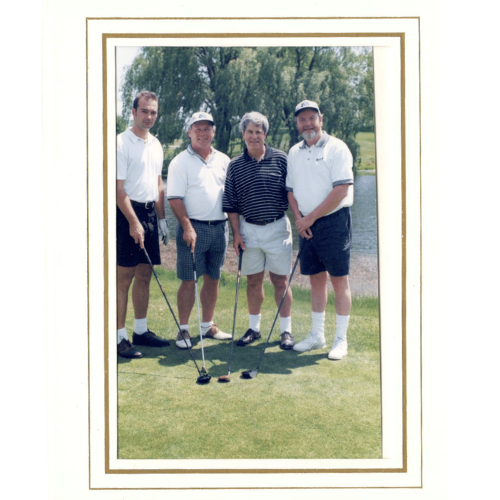

Golf Lessons

Surprising life lessons learned from golf
I get it: some people reading this post will have zero interest in golf. In fact, you might feel just like Winston Churchill, who once dismissively said that golf was “a good walk spoilt.” So, while I am writing this post primarily for people who play golf or like watching the game, I am also hoping that the non-golfers among you might be curious enough to stick around for the life lessons golf can impart. (Maybe it’ll also get you non-golfers to consider a trip to the driving range now that summer is here.)
“And what about you, Tim,” you ask? Well, I am an extremely avid golfer despite being a very average one. That is one of the great beauties of golf: you do not have to be any good to enjoy it. Regardless of how well I play (or not), I always have the benefit of a getting a good walk in. There is much to appreciate about golf: the natural vegetation and the vibrant colours changing with the seasons, the sights and sounds of bird life, and the camaraderie, laughter, and companionship of my fellow golfers. As they say in the Mastercard TV ad, those things are “priceless”!
Without further ado, I present you with 5 powerful life lessons we can take from golf—some of which golf has in common with other sports and some that are unique to golf (and what make the sport so special):
1. “Golf is not a game of perfect.” — Bob Rotella
Golf guru, coach, and author Bob Rotella wrote a popular golf-themed self-help book called Golf Is Not a Game of Perfect. Anyone who has played golf knows that over the 18 holes of a round of golf, you are going to have some less-than-perfect shots. Even if you are exceptionally good, you may still have some perfectly awful shots.
Rotella says there are two ways to react when something like a particularly bad shot occurs. Let us suppose you have just driven your ball into the shrubbery. One way to react would be to smash your club into the ground, stomp your feet, and utter a few choice expletives. Lots of amateurs, with only their ego or pride at stake, react this way, ruining the remainder of their round. A better response, Rotella suggests, would be to say to yourself, “How interesting—that ball I just hit in the bush is going to require some real creativity to get it out—this could be fun!” Bottom line is, keep your eye on the end game, do not take yourself too seriously, and remind yourself that you are not that good a golfer and so you do not need to get frustrated by inevitable short-term setbacks.
2. “If you don’t bring your game with you, you won’t find it here.” —David Sandler
David Sandler created the Sandler Selling System and is the author of the best-selling sales book You Can't Teach a Kid to Ride a Bike at a Seminar. In it, he tells the story of pitching up at a golf club before a tournament with his shag bag full of practice balls. He is out there on the practice range whacking away furiously, trying to warm up for the big game, when he notices the pro pitch up to hit only a few balls before being ready to tee off. Sandler looks at the pro quizzically and asks him, “What gives here, how come you haven’t warmed up?” The pro’s response? “Sandler—if you didn’t bring your game with you, you won’t find it here.” Frantic last-minute preparation will not do you any good if you have not put in the hard practice days in advance. Similarly, when boxing icon Muhammad Ali was asked for his secret to success, he spoke about the importance of preparation: “I run on the road long before I dance under the lights.”
3. “90% of success in golf is having a positive mental attitude, and the other 10% is having a positive mental attitude!”
This tongue-in-cheek message speaks to the critical importance of keeping a positive mental attitude under pressure, especially if you want to play golf competitively. All 120 of the top players in the Professional Golf Association of America have superb skills in the technical department. The winners win, however, because they have an exceptional attitude and a belief in themselves. For those of us who are simply “weekend hackers,” playing for a beer or 50 cents a hole, we too can sometimes put too much pressure on ourselves and fail to enjoy the journey as we make our way around the course. Our goal should be to have fun and enjoy a healthy walk, not to worry about our score. Remember, you are the only one who truly cares about that!
4. “The most important shot in golf is the next one!” — Ben Hogan
Against all the odds, legendary golfer Ben Hogan recovered from a near-fatal car crash to go on to win the U.S. Open. This was one of his famous mantras and is brilliant in its simplicity. We all experience setbacks in life, but too often we carry our “baggage” from past failures, which inhibits our recovery. What has happened is already in the past, and we should try to learn from our mistakes and then move on. We need to leave our “baggage” behind, then focus and put all our energy on whatever happens to be the next crucial step.
5. A good golf swing requires complete follow-through.

As in golf, so too in life. Far too many people have poor follow-through when planning to get together. “We must get together sometime” is vague and sounds nice but deserves to be treated with a certain amount of skepticism. How about saying, “After golf, while we’re having a beer, let’s make sure we agree on our next get-together. Please remind me if I don’t bring it up.” A lack of proper follow-through, either through poor planning or insincerity, leads to a lack of trust, just as it does in your golf swing.
In summary, true success in any endeavour, as in golf, comes from a comprehensive, ongoing, incremental improvement program. This involves paying just as much attention to developing a positive mental attitude as we do to refining technique if we intend to bring about successful, sustainable, long-lasting positive behavioral change.
Subscribe to The Rooney Rambles
Thanks for signing up!
I respect your privacy. Your personal information will never be shared with a third party.